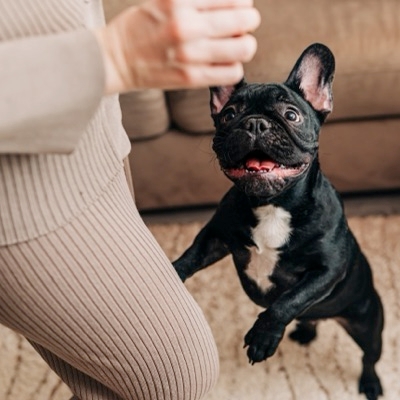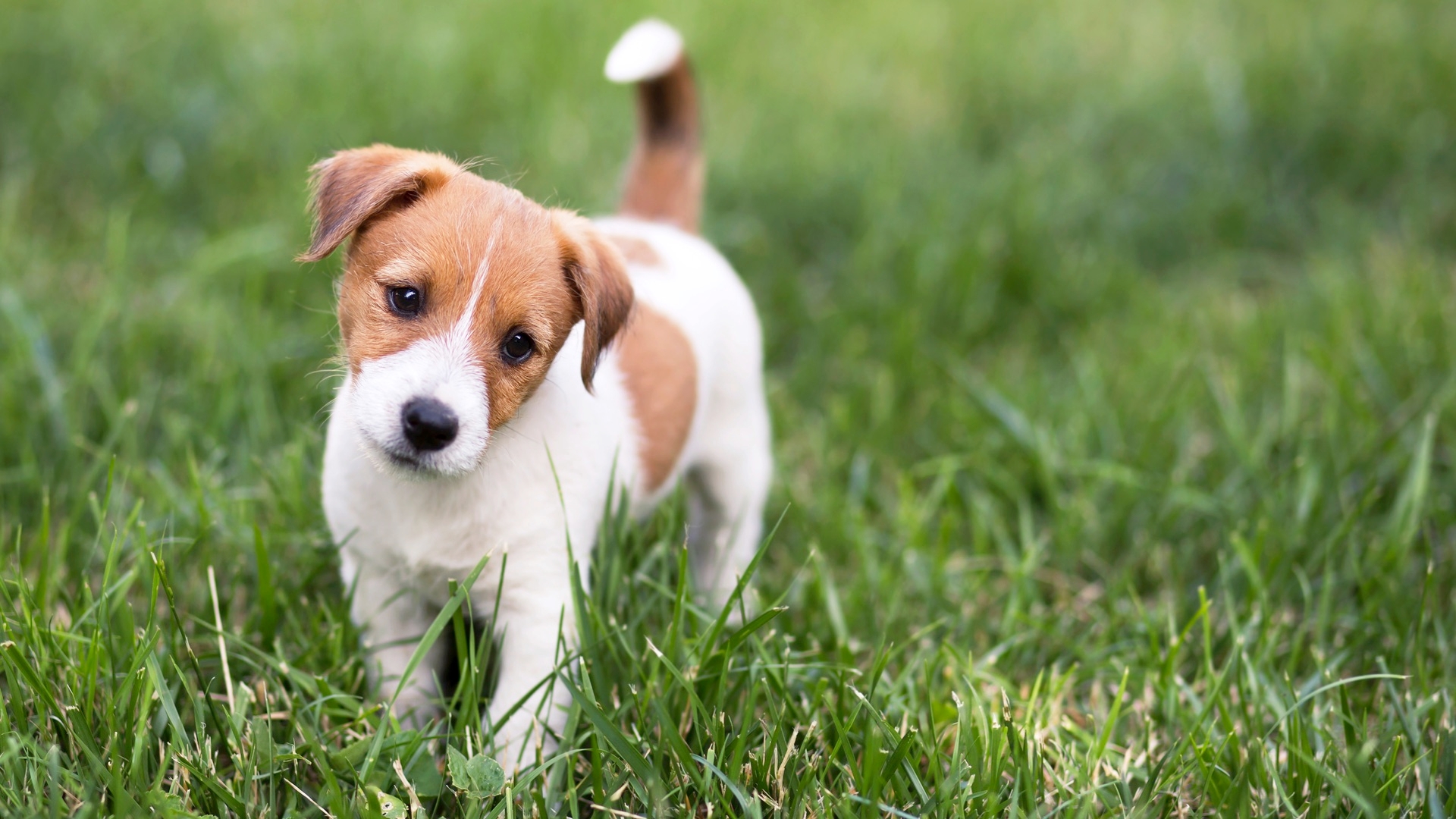Potty Training Your Puppy:
Summary:
Puppies have to go potty. It's teaching them **where** we want them to go that's important. Potty training requires patience and consistency. The following procedures will help minimize house-soiling incidents, but please remember that it is normal for your puppy to have accidents in the house while they are learning. The more consistent you are in following the basic housetraining procedures, the faster your puppy will learn where to go.


Puppies have to go potty. It's teaching them where we want them to go that's important. Potty training requires patience and consistency. The following procedures will help minimize house-soiling incidents, but please remember that it is normal for your puppy to have accidents in the house while they are learning. The more consistent you are in following the basic housetraining procedures, the faster your puppy will learn where to go.
Establish a Routine
- Like babies, puppies do best on a regular schedule. Take your puppy outside frequently, at least every hour and also after waking up and before and after a play session to ensure he has enough opportunities to eliminate outdoors.
- If you have taken your puppy out and you are sure he has to eliminate and he did not do so, do not allow him free access to the house. Hold him, confine him to his crate or play pen, or tether him to you for 10 minutes, then take him out and try again. Keep repeating until you are sure he has eliminated.
- Praise your puppy lavishly every time he eliminates outdoors and give him a treat. You must praise him and give him a treat immediately after he's finished eliminating, not after he comes back inside the house. This step is vital, because rewarding your dog for eliminating outdoors is the only way he'll know that's what you want him to do.
- Choose a location not too far from the door to be the bathroom spot. Always take your puppy, on a leash, directly to the bathroom spot. Take him for a walk or play with him only after he has eliminated. While your puppy is eliminating, use a word or phrase, like "go potty," that you can eventually use before he eliminates to remind him of what he's supposed to be doing.
- Put your puppy on a regular feeding schedule. Depending on their age, puppies usually need to be fed three or four times a day. Feeding your puppy at the same times each day will make it more likely that he'll eliminate at consistent times as well. This makes potty training easier for both of you.
Supervise
Don't give your puppy an opportunity to soil in the house. He should be watched at all times when he is indoors. You can tether him to you with a four or six-foot leash, or use baby gates to keep him in the room with you. Watch for signs that he needs to eliminate, like sniffing around or circling. When you see these signs, immediately take him outside, on a leash, to his bathroom spot. If he eliminates, praise him lavishly and reward him with a treat.
Confinement
When you're unable to watch your puppy at all times, he should be confined to an area small enough that he won't want to eliminate there. It should be just big enough for him to comfortably stand, lie down, and turn around. This area could be a portion of a bathroom or laundry room, blocked off with boxes or baby gates. Or you may want to crate train your puppy and use the crate to confine him. Take him directly to his bathroom spot when you let him out of his crate/confined area and praise him when he eliminates. See our handout Crate Training Your Dog for more information: oregonhumane.org/wp-content/uploads/2.4.17_Crate_Training_Your_Dog.pdf
Oops!
Expect your puppy to have an accident in the house – it's a normal part of housetraining.
- When you catch him in the act of eliminating in the house, say "oops" (be careful not to scare him). Immediately take him to his bathroom spot, praise him and give him a treat if he finishes eliminating there.
- Never punish your puppy for eliminating in the house. Do nothing but clean it up. Rubbing your puppy's nose in it, taking him to the spot and scolding him, or any other punishment or discipline, will only make him afraid of you or afraid to eliminate in your presence which, going forward, can make potty training very difficult.
Cleaning the soiled area is very important because puppies are highly motivated to continue soiling in areas that smell like urine or feces. Use an enzymatic cleaner to help ensure the scent is gone.
It's extremely important that you use the supervision and confinement procedures outlined above to minimize the number of accidents. If you allow your puppy to eliminate frequently in the house, he'll get confused about where he's supposed to eliminate which will prolong the housetraining process.
Paper Training
A puppy under six months of age cannot be expected to control his bladder for more than a few hours at a time. If you have to be away from home for more than four or five hours a day, you'll need to train your puppy to eliminate in a specific place indoors. Choose a puppy-proof room to confine him. There needs to be enough room for a sleeping space, a playing space, and a separate place to eliminate. In the area designated as the elimination place, you can either use newspapers or potty-pads (absorbent pads designed for puppies).
If you get home and find that your puppy hasn't quite gone potty on the paper (or walked through waste and tracked it around), just clean the area quietly and without a fuss. Remember, it is not okay to punish the puppy.
Other Types of House-Soiling Problems
If you've consistently followed the housetraining procedures and your puppy continues to eliminate in the house, there may be another reason for his behavior:
- Medical Problems: Check with your veterinarian to rule out any possibility of an underlying disease or illness.
- Submissive/Excitement Urination: Some dogs, especially young ones, temporarily lose control of their bladders when they become excited or feel threatened. This usually occurs during greetings or if they perceive they are about to be punished. The puppy is just trying to greet or appease you – so ignore him or distract him with a treat or toy. See our handout Dogs and Submissive or Excitement Urination: oregonhumane.org/wp-content/uploads/5.25.17_Submissive_Excitement_Urination.pdf
- Territorial Marking: Dogs sometimes deposit urine or feces, usually in small amounts, to scent mark their territory. Both male and female dogs do this, and it most often occurs when they believe their territory has been invaded. See our handout Dealing with Your Dog's Marking Behavior: oregonhumane.org/wp-content/uploads/5.25.17_Territorial-marking-dogs.pdf
- Fears or Phobias: When animals become frightened, they may lose control of their bladder and/or bowels. If your puppy is afraid (for example of loud noises, such as thunderstorms or fireworks), he may house soil when he's exposed to these sounds.
- Anxiety: Dogs that become anxious may house soil as a result. Please seek professional help if you feel your puppy has anxiety.


